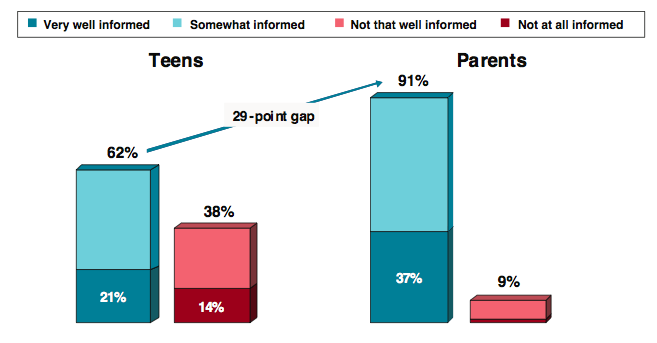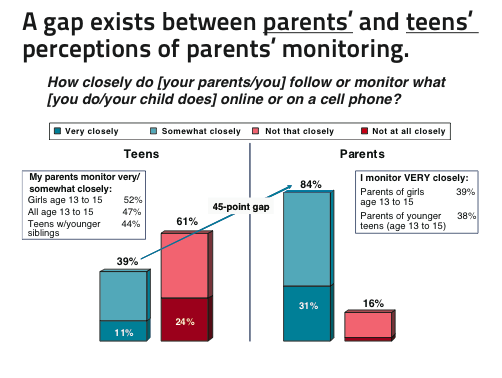For kids and parents, there’s a digital generation gap, but maybe that’s OK

Responses to question “How well informed do you think [your parents/you] are about what [you do/your child does] online and on a cell phone?”
A newly released study (The Online Generation Gap: Contrasting attitudes and behaviors of parents and teens) conducted by Hart Research Associates for the Family Online Safety Institute (FOSI) found a “generation gap” between what parents think they know about their kids online behavior and what the kids think their parents know.
Ninety-one percent of parents say they are “well informed about what their kids are doing online and on their cell phones,” but when you ask teens, only 62% say their parents are well informed (21%) or somewhat well informed (41%).
When it comes to Twitter, the study found 38% of parents say they are “well informed” about their teen’s use of the service, compared to 14% of teens who think their parents are fully clued in. That a 24% gap. There’s an 18 point gap for Facebook and a 14% gap for Pinterest when it comes to how well informed parents think they are compared to what their kids think.
Monitoring
The study found that 84% of parents report that they monitor their teens’ usage very (31%) or fairly (53%) closely, compared to 39% of teens who say their parents monitor them very (11%) or somewhat (28%) closely, which represents a 45-percentage-point gap between parent and teen perceptions. There are some interesting differences based on age and whether kids live in a one or two parent household. Younger teens (13-15) are considerably more likely (45%) to say they’re very or somewhat closely monitored compared to 27% of 16-17 year-olds. Teens who live in households with two parents are more likely (41%) to say they’re monitored than those who live in single-parent households (31%).
Adults matter
Parents may think their kids aren’t listening, but several studies — including this FOSI report — show that they do. “When teens seek out information about how to stay safe online, nearly three in four (74%) turn to their parents.” Two thirds (66%) of kids say they get their safety information from school or teachers.
Does the gap matter?
Some will undoubtedly fret over the perception gap between teens and parents but based on other data from this survey, I’m not all that concerned. Although I don’t know of any old studies to prove this, I suspect that there has always been a gap between what parents think they know about their kids and what kids think their parents know. It certainly was the case in my family when I was a teen. My parents had some idea of what I did during the day, but there were many gaps in their knowledge as I went about my teenage life out of their site whether it was via bicycle during my younger teen years or when I slipped away in the car once I turned 16. What’s important isn’t that parents micromanage their kids or track their behavior but whether they have an open relationship that allows for general communications about important life events and values. Teens need to know that they can come to their parents if they have a problem and want to talk and parents need to know that their teens have internalized important family values when it comes to how they approach decisions that affect their safety and privacy.
Kids feel safe
One of my reasons for optimism is the finding that “95% of teens say they feel very (37%) or somewhat (58%) safe online,” and that parents agree. Ninety four percent of parents say they feel their teen is very (36%) or somewhat (58%) safe online. Just 5% of teens and 6% of parents say they feel unsafe.
What I like about this data is that it tracks reality. The fact is that most kids are reasonably safe online. While we hear about problems, studies have shown that the vast majority of kids are not being bullied or harassed by peers or victimized by predatory adults. The Internet — like life itself — will never be 100% safe, but most kids are pretty savvy when it comes to taking care of themselves online and it’s reassuring to see that parents generally agree.
The study is based on two nationwide online surveys: among 511 13- to 17-year-olds who use the Internet at least occasionally, and another among 500 parents of 13- to 17-year- olds who access the Internet. The Family Online Safety Institute is international non-profit organization online safety. Its supporters include Microsoft, Facebook, Google, Yahoo, AOL, AT&T and other technology companies.
